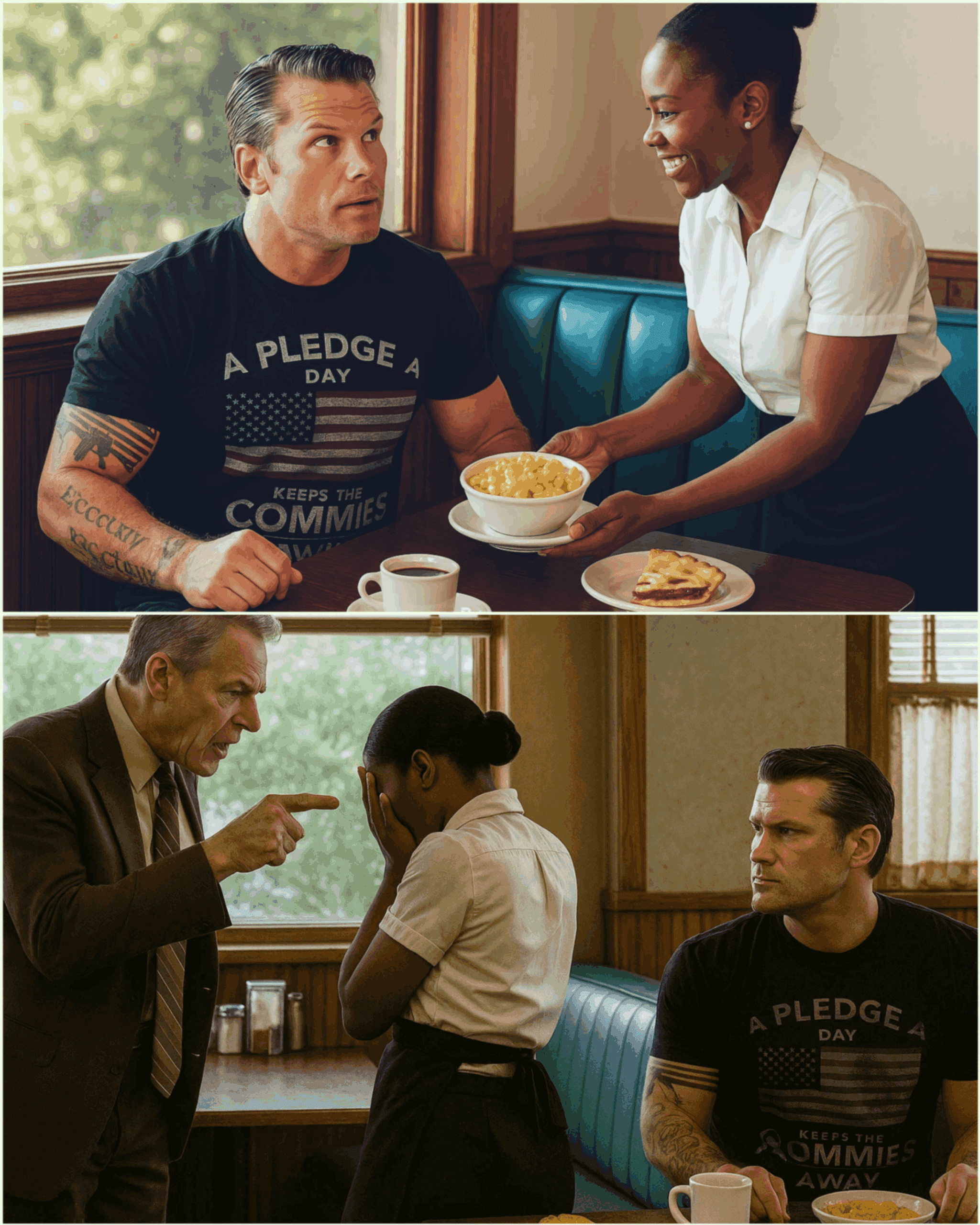Tasha had been working at the small diner on Main Street for nearly six years. The building was worn, with peeling paint and a flickering neon “Open” sign, but it provided steady work — enough to keep the lights on for her 9-year-old son, Mason.

The morning began like any other: the clatter of dishes, the smell of sizzling bacon, and the regulars chatting about the weather. Tasha moved swiftly between tables, pouring coffee refills and sliding plates across the counter with ease. She wasn’t just serving food; she was keeping the rhythm of the place alive.
Then, the doorbell chimed. A man in a gray hoodie stepped inside, walking with a quiet confidence that drew attention without effort. He chose a booth by the window and sat down, lowering his hood.
Tasha recognized him instantly. She had seen him countless times on TV — Pete Hegseth, the television host, veteran, and outspoken advocate for service members. But here, away from the cameras, he was simply a man looking for a meal in a small-town diner.
Not wanting to make a scene, she resisted the urge to ask for an autograph. Instead, she greeted him as she did every customer, walking over with her notepad and a warm smile.
“Good morning. What can I get for you today?”
Pete looked up, returned the smile, and ordered a grilled cheese sandwich with sweet tea.
Tasha jotted down his order, but as she turned to leave, she glanced back. There was something in his expression — not exactly sadness, but a deep weariness, the kind that life presses on a person over time. She had seen it before: truck drivers resting after endless hours on the road, widowers eating alone, soldiers passing through on their way to or from deployment.
When the meal was ready, she placed it in front of him — with a little extra. A small bowl of creamy mac and cheese. Setting it down gently, she said, “You look like you could use something extra today. This one’s on the house.”
Pete paused, then smiled — the kind of smile that reaches the eyes. “Thank you,” he replied, his voice low but sincere.
He finished his meal quietly, left a generous tip, and slipped out without drawing attention. Tasha cleared the table, feeling a quiet pride in the simple kindness she had been able to offer.
But moments later, her manager stormed out of the kitchen.
“Why did you give away food?!” he barked.
“It was just a small bowl—” she began.
“That’s stealing from the business,” he cut her off sharply. “We can’t afford to give handouts.”
Before she could explain, her manager told her to clock out and never return. Fired — all because of a simple bowl of mac and cheese.
That night, Tasha walked home in the cold, her uniform jacket pulled tightly to her chin. The weight of what had happened bore down on her. She dreaded facing Mason. How could she explain that a small act of kindness had cost her the only job keeping them afloat?
What she didn’t know was that Pete had witnessed the whole scene from his booth near the diner window. He had seen the harsh gesture from her manager, had noticed the way she kept her head low as she left.
The next morning, as Tasha was brewing coffee in her small kitchen, a knock came at the door. When she opened it, she froze.
Standing there was Pete Hegseth, still in the same gray hoodie, holding two large grocery bags. Behind him, parked at the curb, was a shiny silver SUV she didn’t recognize.
“Morning, Tasha,” he said with a gentle smile. “Mind if I come in for a minute?”
Still stunned, she stepped aside. Pete placed the grocery bags on her counter — enough food to stock her pantry for weeks. Then he handed her a white envelope.
She opened it slowly. Inside was a letter, handwritten in neat, slanted script.
Inside the envelope was a note:
Tasha,
Kindness costs nothing, but it’s worth everything. I’ve spent much of my life talking about service and sacrifice, and yesterday you lived it without a word.
That little bowl of mac and cheese said more about your heart than any speech ever could.
This is a gift — not charity but recognition. Use it to take care of yourself and your son. Give yourself one un-breathing room, and know that good people still notice good people.Proud to know you,
Pete Hegseth
Tucked with the letter was a check — more than enough to cover several months of rent, utilities, and groceries.
Tasha’s eyes filled with tears. She tried to speak, but the words caught in her throat.
“I… I don’t know what to say.”
“Just promise me,” Pete said softly, “you’ll keep being exactly who you are. The world needs that.”
Before leaving, he crouched to say hello to Mason, who had peeked around the doorway in his pajamas. Pete shook the boy’s hand like he was meeting someone important — because to him, he was.
After he left, Tasha stood in the doorway for a long moment, watching the SUV disappear down the street. She felt something she hadn’t felt in a long time — hope.
It wasn’t about the money or the groceries. It was about being seen, about knowing that even the smallest acts of kindness, somewhere, might be witnessed — and might just change everything.
That night, Tasha made grilled cheese and mac and cheese for dinner. Mason thought it was just a treat. But for Tasha, it was a reminder — of a moment in a worn-down diner, a stranger in a gray hoodie, and the morning her life took a turn she never saw coming.